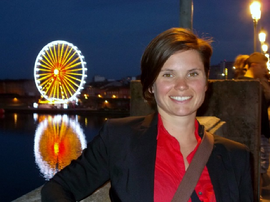
Biography
Brenda studied at the Radboudumc in Nijmegen and did an internship on systematic reviews of animal studies at Syrcle, Nijmegen and studied kidney development at the University of Edinburgh. She graduated in 2014 on the development of an in vitro model to study osteophytes (bony outgrowths common in osteoarthritis) at the department of experimental Rheumatology, Nijmegen. In May 2014 she started her PhD at the University of Twente in the Developmental BioEngineering group of prof. dr. Marcel Karperien. Her current research focuses is finding novel targets for the treatment of osteoarthritis.
Research
Osteoarthritis (OA) is the most common joint disease in which the cartilage that covers articular bones is damaged. Despite extensive research little is known about the initial processes that lead to this cartilage degeneration. Under physiological conditions the oxygen level in cartilage is very low, however during OA these levels are increased. We have found that in vitro cartilage formation is improved when cells are cultured under hypoxic conditions. In other tissues hypoxia initiates many known and unknown metabolome, lipidome and proteome changes that modulate the progression of diseases. We postulate that in the early stages of OA changes in oxygen tension within the cartilages alters the response of the cells to growth factors and cytokines. These changes result in phenotypic alterations of the cells that lead to cartilage breakdown. During her PhD, Brenda will investigating the underlying mechanisms through which hypoxia improves cartilage formation. As such she will contribute to the identification of new biomarkers for early osteoarthritis and may provide new clues for therapeutic intervention.
